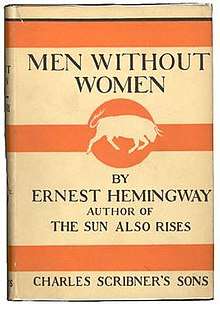Men Without Women (short story collection)
 | |
| Author | Ernest Hemingway |
|---|---|
| Country | United States |
| Language | English |
| Genre | Short stories |
| Publisher | Charles Scribner's Sons |
Publication date | 1927 |
| Media type | Print (hardback & paperback) |
| OCLC | 564429937 |
Men Without Women (1927) is the second collection of short stories written by American author Ernest Hemingway (July 21, 1899 – July 2, 1961). The volume consists of fourteen stories, ten of which had been previously published in magazines. It was published in October 1927, with a first print-run of approximately 7600 copies at $2.[1]
The subject matter of the stories in the collection includes bullfighting, prizefighting, infidelity, divorce, and death. "The Killers", "Hills Like White Elephants", and "In Another Country" are considered to be among Hemingway's best work.[2]
Stories included in volume
The volume includes the following stories:
- "The Undefeated"
- "In Another Country"
- "Hills Like White Elephants"
- "The Killers"
- "Che Ti Dice La Patria?"
- "Fifty Grand"
- "A Simple Enquiry"
- "Ten Indians"
- "A Canary for One"
- "An Alpine Idyll"
- "A Pursuit Race"
- "Today is Friday"
- "Banal Story"
- "Now I Lay Me"
Reception
Men Without Women was variously received by critics. Cosmopolitan magazine editor-in-chief Ray Long praised the story "Fifty Grand", calling it, "one of the best short stories that ever came to my hands...the best prize-fight story I ever read...a remarkable piece of realism."[3]
Some critics, however—among them Wilson Lee Dodd whose article entitled "Simple Annals of the Callous" appeared in the Saturday Review of Literature—found Hemingway's subjects lacking. Joseph Wood Krutch called the stories in Men Without Women "Sordid little catastrophes", involving "very vulgar people."[4]
Hemingway responded to the less favorable reviews with a poem published in The Little Review in May 1929:
Valentine
(For a Mr. Lee Wilson Dodd and Any of His Friends Who Want It)
Sing a song of critics
pockets full of lye
four and twenty critics
hope that you will die
hope that you will peter out
hope that you will fail
so they can be the first one
be the first to hail
any happy weakening or sign of quick decay.
(All very much alike, weariness too great,
sordid small catastrophes, stack the cards on fate,
very vulgar people, annals of the callous,
dope fiends, soldiers, prostitutes,
men without a gallus)[5]
Hemingway's style, on the other hand, received much acclaim. In the New York Times Book Review, Percy Hutchinson praised him for "language sheered to the bone, colloquial language expended with the utmost frugality; but it is continuous and the effect is one of continuously gathering power."[6] Even Krutch, writing in the Nation in 1927, said of Men Without Women, "It appears to be the most meticulously literal reporting and yet it reproduces dullness without being dull."[6]
References
- ↑ Oliver, pp. 218–218
- ↑ Meyers 1985, pp. 195–196
- ↑ Long, pp. 2-3
- ↑ Weeks, Robert P., ed. Hemingway: A Collection of Critical Essays. Englewood Cliffs, N.J.: Prentice-Hall, Inc., 1962. Print.
- ↑ Hemingway, Ernest (May 1929). "Valentine". Little Review. XII: 42.
- 1 2 Bryer, Jackson R., ed. "Fifteen Modern American Authors: A Survey of Research and Criticism". Durham, N.C.: Duke University Press, 1969. Print.
Further reading
- Baker, Carlos (1972). Hemingway: The Writer as Artist (4th ed.). Princeton University Press. ISBN 0-691-01305-5.
- Flora, Joseph M. (2008) "Reading Hemingway's Men Without Women." Kent, OH: The Kent State UP.
- Long, Ray - editor. (1932). "Why Editors Go Wrong: 'Fifty Grand' by Ernest Hemingway", 20 Best Stories in Ray Long's 20 Years as an Editor. New York: Crown Publishers. 1-3
- Meyers, Jeffrey (1985). Hemingway: A Biography. London: Macmillan. ISBN 0-333-42126-4.
- Mellow, James R. (1992). Hemingway: A Life Without Consequences. New York: Houghton Mifflin. ISBN 0-395-37777-3.
- Oliver, Charles M. (1999). Ernest Hemingway A to Z: The Essential Reference to the Life and Work. New York: Checkmark. ISBN 0-8160-3467-2.
External links
- Men without Women at Faded Page (Canada)
- Literary encyclopedia review